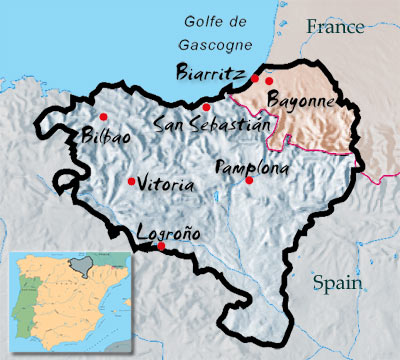 Spain was bracing for fresh attacks by the Basque separatist group ETA on Tuesday after the group called off a 15-month-old cease-fire and vowed to resume its battle for an independent Basque nation.
Spain was bracing for fresh attacks by the Basque separatist group ETA on Tuesday after the group called off a 15-month-old cease-fire and vowed to resume its battle for an independent Basque nation.Ilankai Tamil Sangam
Association of Tamils of Sri Lanka in the USA
Published by Sangam.org
by Victoria Burnett, The New York Times, June 6, 2007
|
In its communiqué, ETA said it was ending the cease-fire because Mr. Zapatero’s style had become “fascist” and the government had responded to the cease-fire with “persecution of all types,” referring to the prosecution of ETA’s supporters and continued police crackdowns on the group’s logistical and political support network. |
 Spain was bracing for fresh attacks by the Basque separatist group ETA on Tuesday after the group called off a 15-month-old cease-fire and vowed to resume its battle for an independent Basque nation.
Spain was bracing for fresh attacks by the Basque separatist group ETA on Tuesday after the group called off a 15-month-old cease-fire and vowed to resume its battle for an independent Basque nation.
The announcement extinguished any lingering hope of reviving the peace talks that collapsed in December when ETA planted a car bomb at the Barajas airport in Madrid, killing two men. It deals a blow to Prime Minister José Luis Rodriquez Zapatero, who staked his political reputation on establishing peace with ETA and who faces a general election in 10 months.
ETA insisted after the car bombing that it had not intended to kill anybody and that the truce was still in place. But in a communiqué sent to Gara, a Basque daily that supports its cause, ETA said Tuesday that the cease-fire would end at midnight, after which it would “take action on all fronts to defend the Basque Country.” ETA routinely issues statements through Gara and another Basque newspaper, Berria.
“This confirms what we had all feared,” said Kepa Aulestia, a commentator on Basque politics who was imprisoned in 1975 for his role in ETA.
The announcement, he said, “does not take us back to the eve of the cease-fire. It takes us back much further.”
Experts on Basque politics said it was not yet clear what form a new ETA offensive would take.
Mr. Zapatero told reporters ETA was “repeating its mistakes” by canceling the cease-fire. He vowed to clamp down on the group.
“ETA’s decision goes totally in the opposite direction of the path that Basque and Spanish society want — the path of peace,” he said. “I am convinced that the Spanish people will secure peace definitively. I will work to ensure this is reached as soon as possible.”
ETA declared a “permanent” cease-fire in March 2006 after crackdowns weakened the group. Three months later, Spain’s government announced negotiations with the organization, but the process stalled, according to government officials and experts, over political demands by ETA that the government refused to consider.
In its communiqué, ETA said it was ending the cease-fire because Mr. Zapatero’s style had become “fascist” and the government had responded to the cease-fire with “persecution of all types,” referring to the prosecution of ETA’s supporters and continued police crackdowns on the group’s logistical and political support network.
Mr. Zapatero called for unanimous support, an oblique reference to the intense disagreement over how to handle ETA that has bitterly divided his Socialist Party and the conservative opposition.
Mariano Rajoy, the leader of the opposition Popular Party, said Mr. Zapatero should state clearly that new negotiations were out of the question.
Mr. Aulestia said the political divisions over how to handle ETA had hurt Mr. Zapatero’s government and strengthened the group’s hand.
“The distance between the parties weakened him, not only in the eyes of his people, but in the eyes of ETA,” he said.
Other experts on Basque politics said they believed that ETA had decided months ago to break the cease-fire but that it wanted to wait until after municipal elections on May 27. ETA’s outlawed political wing, Batasuna, lobbied the government for months to allow its candidates to run in the elections. The government upheld its ban despite fears, expressed by a senior government official ahead of the vote, that this would prompt ETA to renew attacks.
The government also banned about half the candidates of another party sympathetic to ETA, Basque Nationalist Action.
That party nonetheless went on to win 7.5 percent of the municipal vote in the region, giving ETA’s supporters a foothold at the municipal level and access to power and funds, the experts said.
Nonetheless, ETA said the authorities had excluded thousands of sympathizers from the elections and called on Basques to “rebel against this false and rotten democracy.”
© 1996-2024 Ilankai Tamil Sangam, USA, Inc.